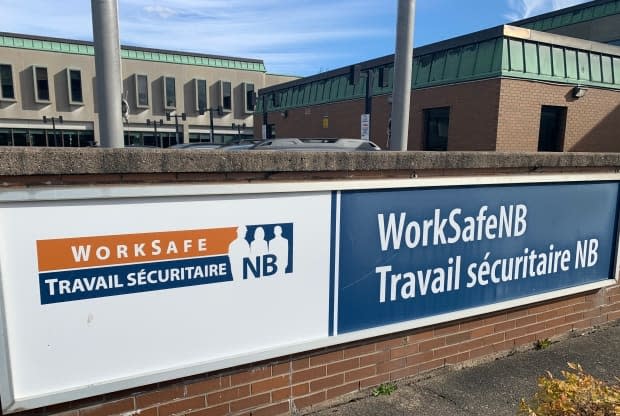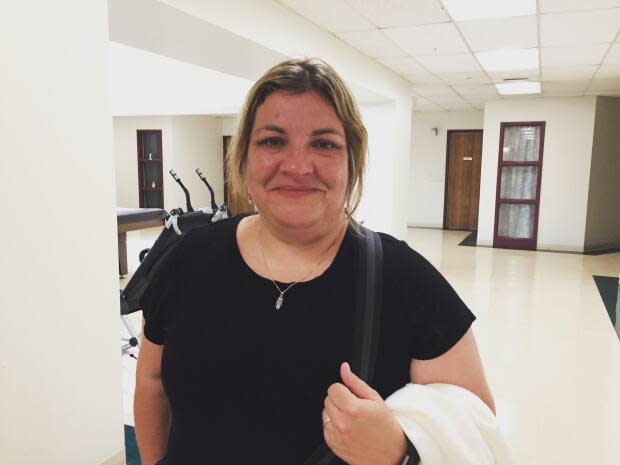N.B. sees spike in COVID-related workers' compensation claims

The number of COVID-19-related workers' compensation claims in New Brunswick increased 533 per cent between the beginning of the pandemic in March 2020 and the end of 2022, and the number of accepted claims jumped nearly 1,521 per cent.
The 2022 claims alone cost more than half a million dollars, including loss of earning and medical aid, while the province's three-year total exceeds $1.4 million, according to figures from WorkSafeNB.
But the nature of the claims, including how many of them involve long COVID or post COVID-19 condition, is unclear.
"If a COVID claim meets the criteria of test of time, place, and activity, it would be accepted and treated as any other claim under the Workers' Compensation Act," said spokesperson Beverly Stears.
"Once accepted, depending on the case, WorkSafeNB may provide wage-loss benefits, medical aid, and rehabilitation services."
Long COVID claims are not differentiated from COVID claims, she said.
424 accepted claims in 2022
There were 582 COVID-related workers' compensation claims filed in 2022, figures from the Crown corporation show.
That's up from the 92 claims filed in 2020 and 150 claims filed in 2021.
Of the 582 claims, 424 were accepted, plus one more that resulted in no lost time, said Stears. Nine are still pending.
By comparison, only 26 claims were accepted in 2020, and 92 in 2021.
It's an acceptance rate of nearly 73 per cent — up from 28 per cent in 2020 and 61 per cent in 2021.
After the story was published, WorkSafeNB provided some 2023 data. As of Feb. 17, 25 COVID claims have been filed. Of those, nine have been accepted, 15 are pending, and one was rejected.
524 days is longest-paid claim
Although Stears could not say how many claims involve long COVID, she did say the longest period of time a person received benefits for a COVID-related claim was 524 days in 2021.
The longest in 2022 was 212 days and in 2020, 208 days.
According to the Public Health Agency of Canada, people who continue to experience physical or psychological symptoms more than 12 weeks after getting COVID-19 have long COVID.
It's unclear how many New Brunswickers suffer from the condition, because the province doesn't track it.

There have been reports of more than 100 symptoms or difficulties with everyday activities associated with long COVID. But some of the most common symptoms adults may experience weeks or months after their initial infection include:
Fatigue.
Memory problems.
Sleep disturbances.
Shortness of breath.
Anxiety and depression.
General pain and discomfort.
Difficulty thinking or concentrating.
Post-traumatic stress disorder (PTSD).
The majority of the COVID-related claims in all three years were in the corrections and health-care sectors, including hospitals, nursing homes and care homes, said Stears.
The majority of claimants were aged 30 to 50.
Forty-five employers had at least one COVID claim, with the majority of them located in the southern part of the province, she said.
Costs in 2020 totalled close to $150,000, slightly more than $750,000 in 2021 and close to $515,000 in 2022.
This represents less than 1.5 per cent of the total cost of all claims, according to figures provided by WorkSafeNB on Friday.
2020 — $61,201,706.
2021 — $53,645,623.
2022 — $36,126,416.
Group sees rise in long COVID-related mobility issues
The increase in claims comes as no surprise to Haley Flaro, the executive director of Ability New Brunswick.
The non-profit organization, whose mission is to empower the independence and full community participation of New Brunswickers with a mobility disability, has also seen a rise in people seeking help for "suspected long COVID or possible post COVID" over the past year and a half, she said.
"I just don't have the exact date, but that's when we started to say, 'OK, this is a new population accessing our services — one we didn't expect."

More than 40 people have contacted Ability New Brunswick, said Flaro.
"Maybe they're no longer able to work and they've lost benefits and they need assistive devices or equipment like a wheelchair, or funding to pay for housing now and accessibility modifications," she said.
"So we're seeing people really in a crisis level as they're trying to figure out their health but also take care of their basic needs."
The people have been of all ages, said Flaro, but she's been surprised by how many of them are young, aged 20 to 35.
Helping them navigate financial aid has been particularly difficult, she said, because long COVID is not recognized as a disability.
"It's unsure how long it may last for people, so there's a hesitancy in providing people with disability benefits through private insurance, through CPP disability, social assistance, because of the unknown about this condition and its impact."
1 accepted claim through social assistance
The Department of Social Development does not provide compensation, but it does provide financial assistance through the social assistance program to those with a financial need, said spokesperson Rebecca Howland.
"To date, we are aware of three applicants to the medical advisory board who have applied specifically because of COVID and one has been approved in accordance with the definition of disabled," she said in an emailed statement.
When a person is assessed for the extended benefits rate for persons living with a disability, through social assistance, it is not based on a single diagnosis, said Howland.
"We look at how that individual's level of autonomy and day-to-day activities are impacted," she said.
A medical exam must be completed and any diagnosis documented as part of the application, which is assessed by the medical advisory board.
Disability support services are also available through the disability support program to New Brunswickers who identify as an individual living with a disability that impacts their activities of daily living, said Howland.
These applications are also assessed based on the impacts of the disability, she said.
Successful applicants are offered services based on need, which could include home support, personal support, transportation, assistive devices, respite, or other individualized needs.


